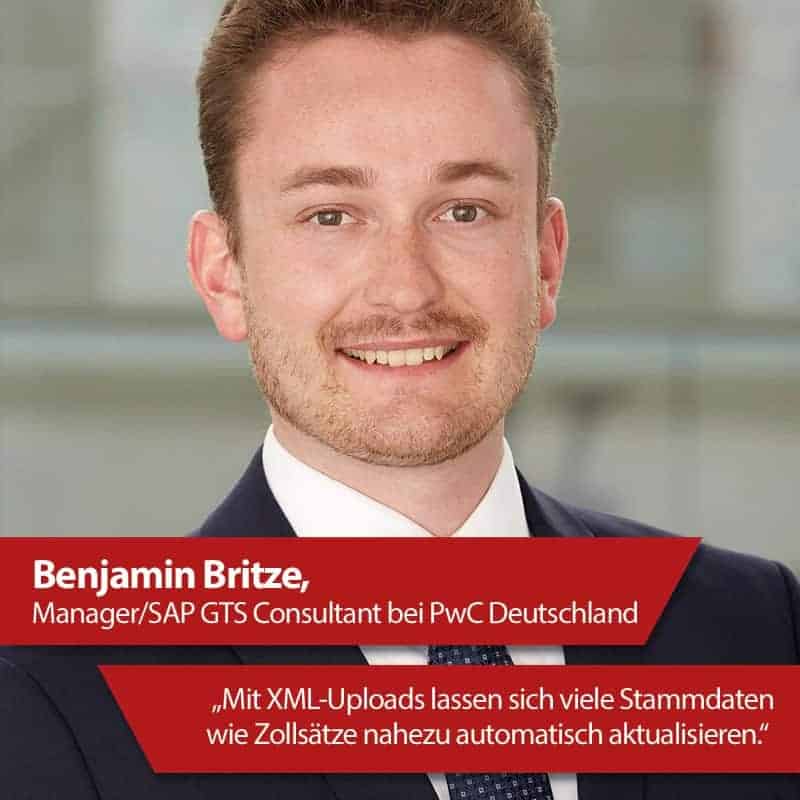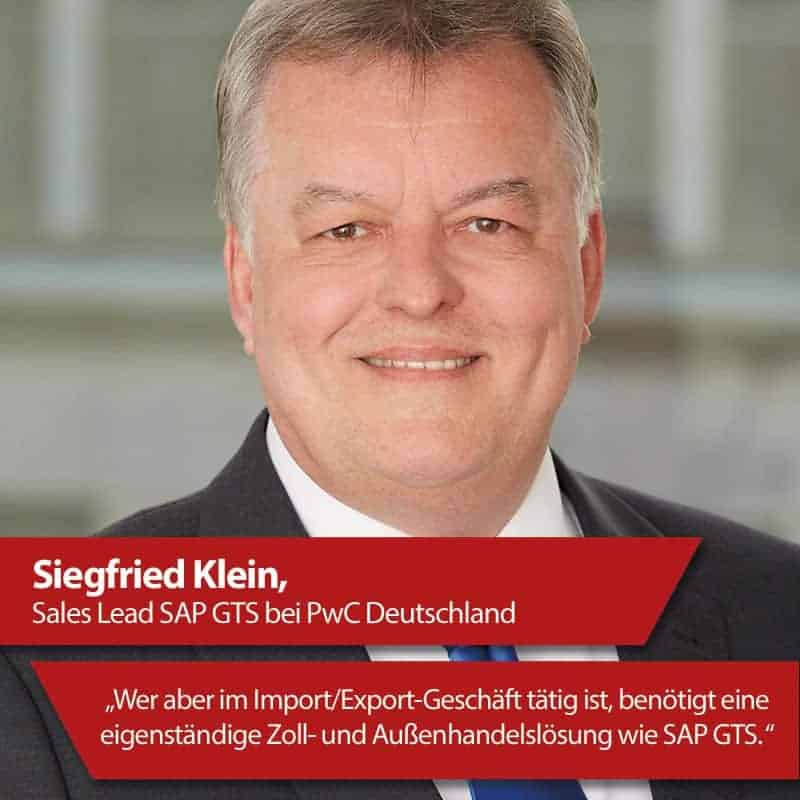Digital customs and foreign trade systems
![[shutterstock.com: 1286042965, DesignRage]](https://e3mag.com/wp-content/uploads/2020/04/shutterstock_1286042965.jpg)

Does my company still need its own customs and foreign trade solution such as SAP Global Trade Services? Siegfried Klein, who is responsible for the sale of customs and foreign trade solutions at PwC Germany, is regularly asked this question by clients.
Especially from those who want to switch to S/4 soon. He can understand the uncertainty. After all, S/4 for International Trade also offers foreign trade functions.
How Klein answers the question depends on the business model of the respective customer - and the wishes that they associate with the solution.
"If you only do a little foreign trade, the reduced functionalities of the International Trade solution are fine"
says Klein.
"But if you are active in the import/export business, you need an independent customs and foreign trade solution such as SAP GTS."
This is particularly true for companies that operate in highly regulated industries and have to demonstrate strict compliance and excellent risk management.
Risk Management
The SAP GTS software has been available to companies since 2000 and is regarded as SAP's central customs and foreign trade platform - and will continue to play a key role in the future.
"GTS remains 'the' SAP solution for complex customs and foreign trade requirements with electronic customs declarations"
explains Steffen Trumpp, Solutions Advisor Expert at SAP for Central and Eastern Europe. For this reason, his colleagues in Walldorf are continuously developing the customs flagship.

One of the reasons why GTS continues to be worthwhile for companies is Brexit. There is no doubt that Brexit will not only make trade with the UK more difficult, but also more expensive.
"That's why companies should really make the most of the optimization opportunities that exist in global trade"
advises Benjamin Britze, SAP GTS consultant at PwC.
Companies that export a lot can reduce import duties thanks to preferential agreements, and sometimes even achieve complete exemption from customs duties.
Companies can also reduce their import costs: For example, companies must then declare the expenses for processing procedures or for the implementation of a customs warehouse.
Prerequisite: The selected software solution is able to implement the necessary steps efficiently. GTS has a clear advantage here because it has comprehensive preference management. Companies can therefore use trade agreements automatically to their own advantage.
Closely synchronized with the material and sales data from SAP ERP or S/4, GTS calculates the preferential eligibility for a wide range of trade agreements and can thus help to reduce the burden of customs duties.
Another risk management component is also not included in International Trade: export refunds. GTS thus guarantees that all requirements for the application and approval of export refunds are met.
Communication with customs
The advantages of GTS stand out particularly clearly when communicating with customs.
"With customs management, International Trade only offers tariff classification"
says Britze.
And this is another area where the comprehensive GTS service scores highly: if the authorities change master data, this must be updated in the system. A large amount of master data can be uploaded to GTS via XML files from data providers such as the Federal Gazette. Britze:
"With XML uploads, a lot of master data such as customs records can be updated almost automatically."
In the area of international trade, this is only possible for commodity codes by connecting to a data provider. The GTS customs package also includes electronic customs declarations, import management with transit procedures and customs warehouse processing as well as excise duty monitoring. These components are also missing from International Trade.
Fast pace of innovation
Sanctions lists, which prohibit trade with certain persons or companies, are binding for every company. This is why the sanctions list check is an integral part of SAP GTS. Users of International Trade, on the other hand, need an extra license to obtain the watch list check via the SAP Cloud Platform.
International Trade is integrated into S/4 as a module, whereas GTS must first be integrated via a standard interface. However, in the opinion of PwC expert Britze, this does not speak in favor of International Trade.

His counter-argument: The plug-in allows GTS to access all relevant data from S/4.
"But because it's a separate system, service packs can be installed more quickly."
In S/4 Hana, such service packages not only include changes in the International Trade area, but also changes to the other modules. As a result, significantly more tests are required. That costs time.
However, speed is an advantage that is particularly noticeable in customs and foreign trade. Changes are on the agenda here - even without Brexit, the trade dispute or the current discussion about eco-tariffs.
What's more, companies that used the Foreign Trade module in SAP ECC will not simply have access to its data at the touch of a button after the changeover to S/4.
The transition from foreign trade to international trade requires a migration. According to the PwC expert, companies should therefore consider investing in GTS right away. "Then," adds Siegfried Klein, "they will have software that maps customs and foreign trade processes holistically."
Affordable via the cloud
Especially as they do not have to purchase a license for the GTS software, but can use it far more cheaply as a cloud solution. Providers such as PwC have been operating scalable GTS systems in the cloud for years.
"This makes them affordable for companies of all sizes"
says Klein.
Companies can decide whether they want to use all or only certain functions of the software. When choosing a provider, the expert advises paying attention to several points. For example, SAP partners must operate GTS in secure data centers and connect the solution to the customer's SAP pre-systems via a secure VPN tunnel.
The provider should also offer a comprehensive service and be able to support its customers from consulting to operation. Particularly important: IT expertise is not enough in customs and foreign trade, says Klein.
The cloud service provider must be able to prove that it is just as well versed in legal issues. The degree of flexibility they offer their customers can easily be seen from whether they only provide the solution as software as a service at a fixed monthly price or also as a usage-based on-demand variant.




